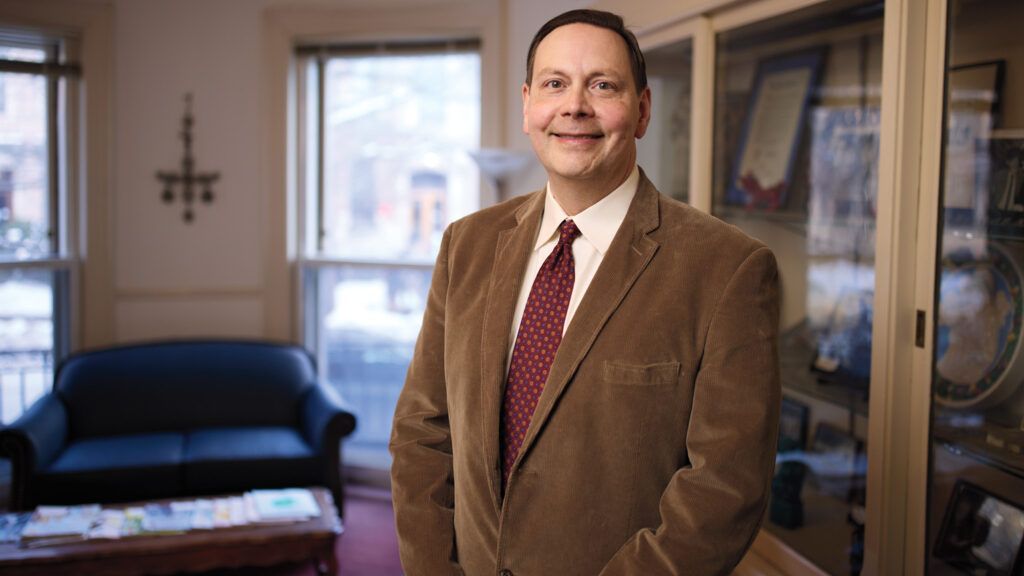Dr. Steven Sandage worked as a Dr. chaplain in prisons, geriatric facilities, group homes for boys and mental health facilities. During that time, he was drawn to the work of helping people who were struggling to find hope. Now a professor of psychology of religion and theology with Boston University, Dr. Sandage studies the intersection of spirituality and mental health. His books and research explore how we can use both psychology and theology to cultivate hope through prayer, connection and healing. We spoke with him about what science can tell us about hope and prayer, and what we still have to learn about the role God can play.
What made you want to study the connections between spirituality and mental health, specifically the concept of hope?
I had a powerful experience during my doctoral studies in psychology that made me really interested in the connection between faith, psychology and hope.
I was in my mid-twenties, and I’d always thought I had a strong commitment to my faith. But after several stressful years working with people in correctional facilities and mental health centers, I felt the foundations of my faith destabilizing. It was a time of spiritual turbulence for me. It all came to a head when my mother had a prolonged health crisis. I got a call late one night about yet another trip to the emergency room and an uncertain prognosis. When I got off the phone, I felt nothing but despair.
I felt compelled to leave my apartment and head outside into the night to take a walk. I started talking very honestly with God about my feelings of mistrust through a kind of spontaneous lament. The dark night was suddenly incredibly quiet and spacious around me, and a stillness came over me. My feet literally felt secure on the ground, and deep inside I felt a new and intense sense of hopefulness.
What did you make of this profound experience?
I knew this was a new kind of hope for me, one I felt amid ambiguity and doubt. It was a hope of active surrender beyond all the possible outcomes of my situation, and I was intrigued by it.
I was reminded of John Wesley, the founder of Methodism, who had a similar spiritual experience. He was struggling with his faith when, one night, he went to a religious meeting in London. Wesley later recounted in his journal that at the meeting, he felt his heart “strangely warmed” and that he truly trusted Christ for his ultimate salvation. It’s a wonderful description of a deep and powerful spiritual experience that signaled a shift in his ultimate source of hope, from striving for achievement to trusting in grace. He did not just consciously decide to hope differently; it was a deeper spiritual and psychological process involving a transformed relationship with the ultimate source of meaning.
Looking back, I feel similarly about that moment of hopefulness I had on that walk that night—the spiritual difficulty I faced and the quiet, grounded hope that came when I authentically met with God. I became more interested in hope when I read theories about hope as a crucial ingredient for change. My exposure to the suffering that people experience in prisons and mental health settings led me to wrestle with my knowledge of hope and to reach for a deeper understanding.
Speaking as both a psychologist and a theologian, how would you define hope?
Hope is an active anticipation in the ability to reach desired goals. It requires a willingness to put energy toward those goals.
What’s interesting to me is that hope is most helpful for goals that are extremely challenging. We don’t always need hope for something that’s easy to do. It becomes crucial when that goal is not necessarily within our grasp, and we don’t have total control over the whole process. Our ultimate source of hope involves beliefs that are often theological.
Why is hope such an important part of psychological health?
There are numerous virtues that offer “windows” into the intersection of spirituality and psychology—such as forgiveness, justice, humility and gratitude—but hope is an important one, because without some belief in the possibility of getting toward a desired end, it’s hard to make progress in life. Students who are more hopeful do better academically. People who are in rehabilitation for physical injuries or psychotherapies tend to have better outcomes if they have a strong degree of hope. Years ago, the psychiatrist Jerome Frank argued that hope was vital in most forms of healing around the world.
In what ways have you seen psychology and hope converge in your own professional practice?
As a psychologist who works with people who are suffering, I’ve noticed a benevolent force sometimes renewing hope in the face of difficult circumstances. This happens in addition to the conscious, psychological work the patient and I are doing. From my own Christian tradition, I believe this force is God working through the unconscious to generate change and transformation.
One particular case comes to mind. I was working with the mother of a young man who was struggling with severe mental and behavioral problems. Though she cared for her son tremendously, this mother was having a hard time getting herself together to be an effective parent. She had struggled with substance abuse problems in the past. Even though she had been sober for a while, she still felt a lot of guilt and shame. We’d worked out some things through family therapy, but she told me she still didn’t feel confident to do what it took to be a good parent.
Then one day she came into a session, and she was palpably different. She was filled with so much hope. When I asked her what had changed, she said she’d had a dream. In it, she said that God had come to her and told her, “Greater is he that is in you, than he that is in the world” (1 John 4:4). It was as if this dream had gotten ahold of her, and she felt a new kind of strength. As I worked with her after that, she was very different in her outlook. This was such a rich example of psychology and belief coming together. She’d been going to therapy and AA for several years and had started going back to church. And then this message in a dream from God transformed her perception of herself and her life. All the while, hope had been brewing.
That’s remarkable! What did you learn from that experience as a psychologist?
I loved the mystery of it. It showed me there are certain steps I can take to go deeper with someone, but there could be things happening beyond my awareness that might make a real difference as well. I could unpack my patient’s issues with the psychology of hope, but none of us can arrange for a dream from God. The experience reminded me that hope can be developing before we even fully know it—and I think that’s very hopeful in and of itself. I personally believe there is a benevolent force that is trying to help, and I think it’s necessary for me as a psychologist to cooperate with that force.
What role does prayer play in fostering hopefulness?
Hope requires a kind of spiritual stretching. If I am trying to move toward something I want that is particularly challenging, I am going to need to add a spiritual practice, such as prayer or meditation, to help restore a balanced mindset in which hope can grow.
I’ve done empirical studies on hope and prayer, and I’ve found some interesting things. For example, one study showed that petitionary forms of prayer, or prayers that directly ask for things, are a little complicated when it comes to hope. These prayers were helpful some of the time, but they could also have a negative effect on hopefulness, particularly for folks who were in a very difficult place. They can cause people dealing with shame, anxiety or depression to get into a negative spiral of asking for something specific over and over. In fact, some people I’ve seen who engage in only very specific petitions of prayer can become more discouraged.
On the other hand, I discovered that contemplative prayer—or prayer that is more meditative—was more conducive to hopefulness. These prayers are less about a wish list and more of a spiritually embodied practice. Contemplative prayer can regulate the body and mind, by slowing our breathing and getting us to focus on the positive experience of prayer with God. To remain hopeful, it can help to have a grounding spiritual relationship with the divine, and contemplative prayer lends itself to that.
Are there any best practices for cultivating hope in addition to contemplative prayer?
Yes. You can reflect on times you felt hopeful in the past, when you worked toward a goal that you weren’t sure you could achieve and did. You can connect with people who have cared for you in the past and expressed some hopefulness for you. That could be anyone, including a teacher, a spiritual leader, a coach or a family member. Even if those people are not in your life anymore, you can reflect on that relationship and the encouragement it provided.
Another important strategy can be to break down a large, difficult goal into smaller, more manageable goals. People can then titrate their hopefulness throughout the process. And if someone is having a really hard time cultivating any hope at all, it’s important to see if they can find their way into a therapy relationship and a relationship with a wise mentor who can hold their hope for them during a period of despair.





